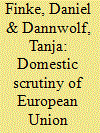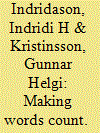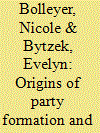|
|
|
Sort Order |
|
|
|
Items / Page
|
|
|
|
|
|
|
| Srl | Item |
| 1 |
ID:
123009


|
|
|
|
|
| Publication |
2013.
|
| Summary/Abstract |
Some European law proposals are subject to scrutiny by national parliaments while others go unchecked. The analysis in this article indicates that the opposition scrutinises European Union law to gather information on the proceedings inside the Council of Ministers and the European Parliament. Yet whereas strong opposition parties scrutinise highly politicised law proposals, weak opposition parties tend to scrutinise those proposals that are negotiated under the non-transparent fast-track procedure. In addition, there is ample evidence that the leading minister initiates scrutiny in order to strengthen his or her intergovernmental bargaining leverage. Yet, this Schelling Conjecture presumes that the party of the minister is located between the expected bargaining position in the Council and the coalition partner. Any other domestic interest constellation could lead to scrutiny motivated by whistle blowing. However, an issue's salience helps us to separate the whistle blowing from the Schelling Conjecture.
|
|
|
|
|
|
|
|
|
|
|
|
|
|
|
|
| 2 |
ID:
123012


|
|
|
|
|
| Publication |
2013.
|
| Summary/Abstract |
This article addresses the effects of decentralisation reforms on regionalist parties' electoral strength. It takes up the debate between 'accommodatists' (i.e., electoral loss due to policy accommodation) and 'institutionalists' (i.e., electoral gain due to institutional empowerment). These effects depend on the electoral venue considered - regional or national - and on the ideological radicalism of a given regionalist party - secessionist or autonomist. This study finds that increases in the level of decentralisation are positively associated with higher scores for autonomist parties in regional elections, while they are not statistically significantly correlated with secessionist parties' electoral performances. In contrast, in national elections, decentralisation reforms seem to penalise autonomist parties more than secessionist ones. These findings are based on the analysis of a novel dataset which includes regional and national vote shares for 77 regionalist parties in 11 Western democracies from 1950 until 2010.
|
|
|
|
|
|
|
|
|
|
|
|
|
|
|
|
| 3 |
ID:
123013


|
|
|
|
|
| Publication |
2013.
|
| Summary/Abstract |
The cabinet is a central actor in policy making in parliamentary systems. Yet, relatively little is known about how coalition cabinets operate. The delegation of decision-making authority to ministers invites policy drift, which threatens the cohesiveness of the cabinet's policy programme. Cabinets employ a variety of methods to contain policy drift. The writing of coalition agreements is among the major tools, but there are others, including limiting ministerial autonomy and the use of junior ministers to shadow ministers. The present study demonstrates that coalition agreements are written to contain policy drift and that it is directly related to the degree of hierarchy in the cabinet. It studies the factors that affect the likelihood of a coalition agreement being written and how extensive they are, if written. Among these are the ideological diversity found in the cabinet, the use of alternative methods for controlling ministers and the complexity of the bargaining situation.
|
|
|
|
|
|
|
|
|
|
|
|
|
|
|
|
| 4 |
ID:
123011


|
|
|
|
|
| Publication |
2013.
|
| Summary/Abstract |
Which new parties entered national parliaments in advanced democracies over the last four decades and how did they perform after their national breakthrough? This article argues that distinguishing two types of party formation (that facilitate or complicate party institutionalisation) helps to explain why some entries flourish, while others vanish quickly from the national stage. New parties formed by individual entrepreneurs that cannot rely on ties to already organised groups are less likely to get reelected to parliament after breakthrough than rooted newcomers. This hypothesis is tested on a newly compiled dataset of new parties that entered parliaments in 17 advanced democracies from 1968 onwards. Applying multilevel analyses, the factors that shape newcomers' capacity to reenter parliament after breakthrough are assessed. Five factors have significant effects, yet affect party performance only in particular phases: both a party's electoral support at breakthrough and its operation in a system with a strong regional tier increase the likelihood of initial reelection. In contrast, a distinct programmatic profile, the permissiveness of the electoral system and easy access to free broadcasting increase a party's chance of repeated reelection. Only formation type significantly affects both phases and does so most strongly, substantiating the theoretical approach used in this article.
|
|
|
|
|
|
|
|
|
|
|
|
|
|
|
|
| 5 |
ID:
123010


|
|
|
|
|
| Publication |
2013.
|
| Summary/Abstract |
This article demonstrates that two quite distinctive types of political disaffection - 'dissatisfied democratic' and 'stealth democratic' - exist among British citizens, with the former being more prevalent. While both types manifest low trust in political elites, the dissatisfied democrat is politically interested, efficacious and desires greater political participation, while the contrary is generally true of the stealth democrat. However, stealth democrats are favourably disposed towards direct democracy, which can be attributed to the populist nature of stealth democratic attitudes. Even so, when given the opportunity to take part in a national referendum, neither stealth democrats nor dissatisfied democrats showed much inclination to vote.
|
|
|
|
|
|
|
|
|
|
|
|
|
|
|
|
|
|
|
|
|